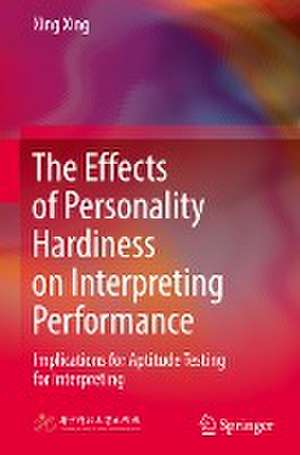The Effects of Personality Hardiness on Interpreting Performance: Implications for Aptitude Testing for Interpreting
Autor Xing Xingen Limba Engleză Hardback – 4 oct 2023
The book presents a literature review and empirical survey, which reveal, e.g., that aptitude testing for interpreting attaches great importance to cognitive aptitude. In contrast, non-cognitive attributes (personality in particular), while also considered important, are seldom measured, due to their complex structure and the lack of scientific measurement tools. Bearing this gap in mind, the book focuses on research into personality traits in aptitude testing for interpreting, with an aim to expanding the objective means of testing candidates for the requisite knowledge and skills. It is devoted to an empirical investigation into the effects of personality hardiness on interpreting performance, with interpreting anxiety and self-efficacy as two intermediates. To this end, a quantitative method (questionnaire survey) and a qualitative in-depth interview were used with 149 Chinese student interpreters at postgraduate level. The results indicate that personality hardiness is a valuable trait for student interpreters. By systematically presenting the effects of personality hardiness on interpreting performance, the book offers both theoretical and empirical stepping stones to understanding the position of personality hardiness in aptitude testing for interpreting, providing stakeholders with valuable insights into and blueprints for selecting the most teachable candidates for interpreting training programs.
Preț: 696.82 lei
Preț vechi: 819.79 lei
-15% Nou
Puncte Express: 1045
Preț estimativ în valută:
133.34€ • 139.57$ • 110.98£
133.34€ • 139.57$ • 110.98£
Carte tipărită la comandă
Livrare economică 31 martie-14 aprilie
Preluare comenzi: 021 569.72.76
Specificații
ISBN-13: 9789819963348
ISBN-10: 9819963346
Ilustrații: XX, 151 p. 29 illus., 3 illus. in color.
Dimensiuni: 155 x 235 mm
Greutate: 0.42 kg
Ediția:1st ed. 2023
Editura: Springer Nature Singapore
Colecția Springer
Locul publicării:Singapore, Singapore
ISBN-10: 9819963346
Ilustrații: XX, 151 p. 29 illus., 3 illus. in color.
Dimensiuni: 155 x 235 mm
Greutate: 0.42 kg
Ediția:1st ed. 2023
Editura: Springer Nature Singapore
Colecția Springer
Locul publicării:Singapore, Singapore
Cuprins
Chapter 1 Introduction.- Chapter 2 Literature Review.- Chapter 3 Personality Hardiness and Aptitude Testing for Interpreting.- Chapter 4 Research on the Effects of Personality Hardiness on Interpreting Performance.- Chapter 5 Implications of Research on the Effects of Personality Hardiness on Interpreting Performance.- Chapter 6 A Tentative Framework for Personality Hardiness Measurement in Aptitude Testing for Interpreting.- Chapter 7 Conclusion.
Notă biografică
Xing Xing is an associate professor at the School of Foreign Languages of South-Central Minzu University, where she teaches English-Chinese consecutive interpreting and simultaneous interpreting. Holding a doctorate in Interpreting Studies from Xiamen University, her research interests include interpreting testing and assessment, interpreting pedagogy and SLA.
Textul de pe ultima copertă
This book sheds new light on personality dispositions research into interpreter performance, injecting fresh impetus for a new research agenda designed to further our understanding of hardiness–performance linkages in interpreters. Interpreters are made not born (Mackintosh, 1999: 67), i.e., it is generally assumed that everyone has the potential to become an interpreter, given proper training. Nonetheless, time constraints and financial limitations make it advisable to select applicants who need the least training. Aptitude testing for interpreting, with a purpose to admitting the most promising candidates, has thus become not only a practical necessity for institutions but also a central issue among interpreting researchers.
The book presents a literature review and empirical survey, which reveal, e.g., that aptitude testing for interpreting attaches great importance to cognitive aptitude. In contrast, non-cognitive attributes (personality in particular), while also considered important, are seldom measured, due to their complex structure and the lack of scientific measurement tools. Bearing this gap in mind, the book focuses on research into personality traits in aptitude testing for interpreting, with an aim to expanding the objective means of testing candidates for the requisite knowledge and skills. It is devoted to an empirical investigation into the effects of personality hardiness on interpreting performance, with interpreting anxiety and self-efficacy as two intermediates. To this end, a quantitative method (questionnaire survey) and a qualitative in-depth interview were used with 149 Chinese student interpreters at postgraduate level. The results indicate that personality hardiness is a valuable trait for student interpreters. By systematically presenting the effects of personality hardiness on interpreting performance, the book offers both theoretical and empirical stepping stones to understanding the position of personality hardiness in aptitude testing for interpreting, providing stakeholders with valuable insights into and blueprints for selecting the most teachable candidates for interpreting training programs.
Caracteristici
Presents interdisciplinary research on psychology and second language acquisition Provides stakeholders with insights/ blueprints in selecting the most teachable candidates Sheds light on personality dispositions research on interpreter performance
